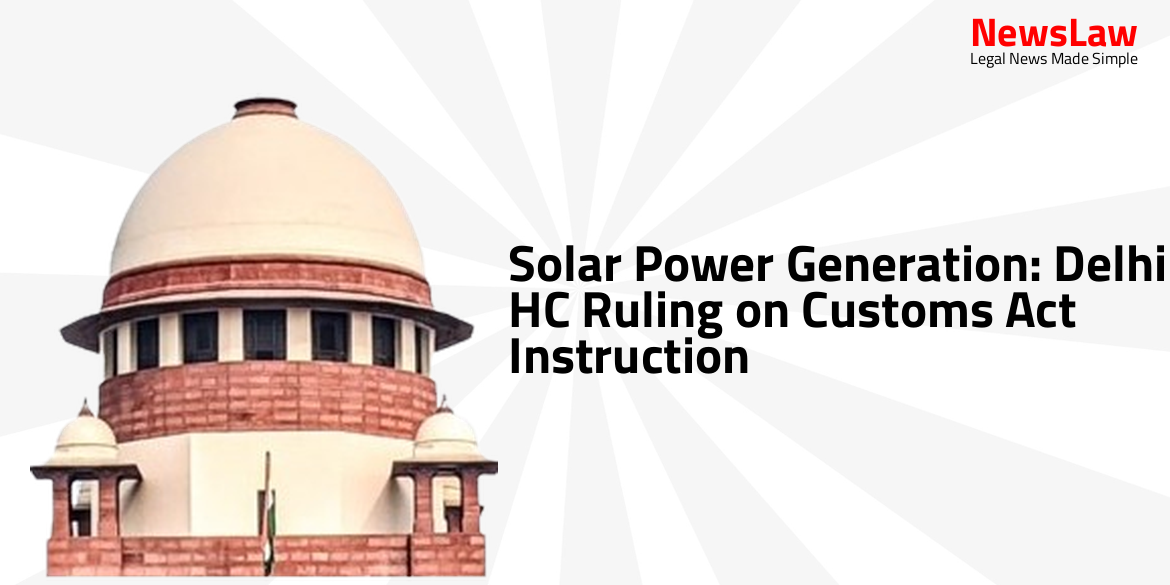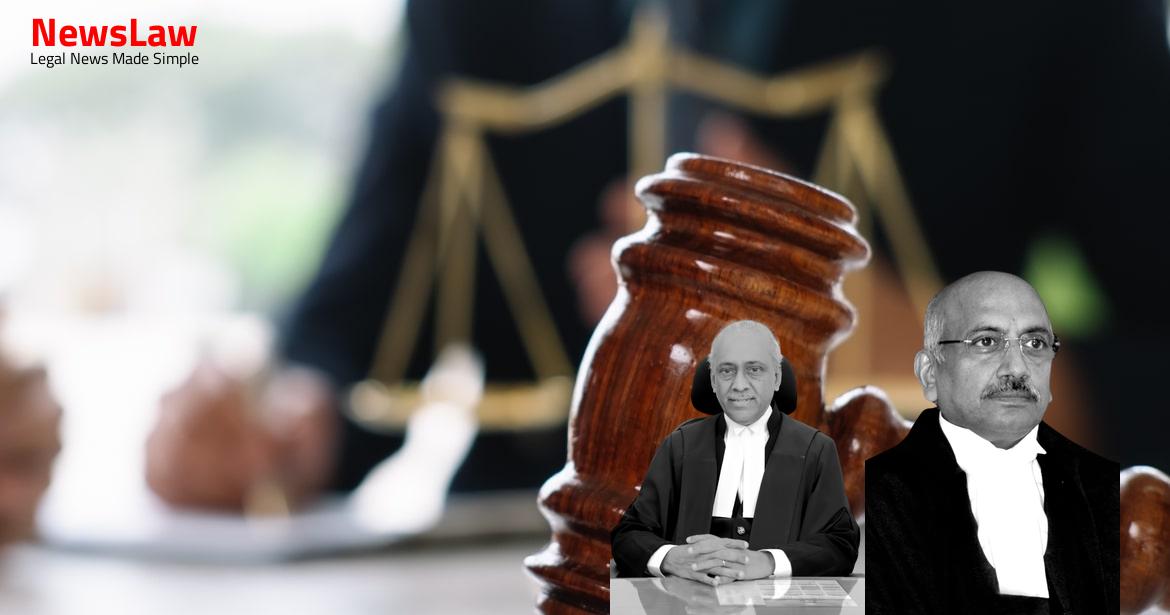In a crucial case concerning solar power generation, the Delhi High Court has delivered a significant ruling on the Customs Act Instruction. The judgment has far-reaching implications for the industry and regulatory framework surrounding solar energy in India.
Facts
- The Court noted the challenge made by the Petitioner against the impugned Instruction dated 09 July 2022 issued by the Central Board of Indirect Taxes and Customs.
- The Instruction pertains to the warehousing of imported capital goods used in the generation of solar power.
- The Petitioner argued that the Instruction is ultra vires Section 151A of the Customs Act, 1962 and is inapplicable to the Manufacture and other Operations in Warehouse (No.2) Regulations, 2019.
- Various Show Cause Notices were issued to the Petitioner based on the impugned Instruction, questioning the validity of their warehousing license.
- In one specific case (W.P.(C) 12386/2022), a letter dated 23 August 2022 required a provisional duty bond for the release of imported goods.
- Another Petitioner in W.P.(C)10838/2022 contested the Instruction and also challenged the letter dated 19 July 2022 which cancelled their warehouse license.
- BCD was imposed in 2022-23 leading to a reduction in imports overall.
- However, import of solar modules increased in 2023-24.
- The data on import of solar modules is presented in the chart.
Issue
- The main issue at hand is whether the Circular issued by the respondents can be considered as a revenue legislation for imposing excise duty.
- Another question is whether the suits must pertain to the recovery of possession of immovable property in Greater Bombay to satisfy the third condition.
- The interpretation of Section 37-B of the Act is essential to address the scope and applicability of Excise 37B.
- The primary focus is on determining whether the dominant purpose test or the theory of apportionment should be applied in interpreting Section 14-A of the Act.
- The dispute revolves around the interpretation of the phrase ‘in relation to’ concerning dividend income earned on shares, even if the dominant purpose of investing in those shares was not to earn dividends.
Arguments
- The petitioners have imported solar cells and panels as capital goods into India.
- The grant of a license under the MOOWR Regulations is considered a judicial act.
- The cancellation of a license would also be viewed as a judicial act, necessitating an inquiry and investigation following principles of natural justice.
- The Union Government’s stance is that capital and non-capital goods can remain warehoused until clearance or consumption.
- The cancellation of the petitioner’s license being invalid due to lack of opportunity given, as goods were not cleared for home consumption.
- Solar power plants and projects were excluded from Project Imports in the 2023-24 Union Budget.
- Section 57 enables licensing of a public warehouse by the Principal Commissioner/Commissioner of Customs.
- The imported solar cells and panels do not undergo any manufacturing process in the bonded warehouse.
- The applicability of Sections 61 and 65 needs to be understood in light of the facts presented.
- The MOOWR Regulations and Sections 61 and 65 do not exclude manufacturing activity in a bonded warehouse with imported capital goods.
- The benefit of Section 65 would be applicable if manufacturing operations were conducted in connection with warehoused raw materials or inputs.
- The customs authorities are restrained from granting new licenses and are directed to review and cancel existing licenses as per the impugned Instruction.
- The petitioners’ licenses were granted before the levy of BCD, and hence, allegations of circumvention are baseless.
- Section 65 allows warehoused goods to be used in any manufacturing process or other operation.
- The observance of natural justice is crucial in cases of license cancellation, requiring an opportunity for the licensee to respond to allegations of breach.
- An authoritative determination on the scope of Section 65 with the MOOWR Regulations is deemed essential in the current petitions.
- Mr. Ghosh, learned senior counsel for ACME and AVAADA, questioned the interpretation of Sections 61 and 65 of the Act.
- He argued that solar panels and modules being considered as capital goods should be governed by Section 61(1)(a) for warehousing period and duty deferment.
- Mr. Ghosh emphasized that the criteria under Section 65 is the connection with warehoused goods for manufacturing process or operations.
- The counsels addressed the larger question of whether solar power generation falls under Section 65 of the Act.
- It was contended that the Act and MOOWR Regulations do not exclude solar power generation from their scope.
- Mr. Ghosh pointed out that prior to April 1, 2022, solar cells and modules attracted zero Basic Customs Duty.
- He argued that if an authority’s power is quasi-judicial, it cannot be controlled by directives.
- The distinction between ‘in manufacture of’ and ‘in relation to’ was highlighted by Mr. Ghosh.
- It was stressed that the impugned Instruction misunderstood the scheme of Sections 61 and 65 and the MOOWR Regulations.
- Mr. Ghosh concluded by stating that capital goods can remain warehoused until cleared, contrasting with other goods which are consumed or cleared from the warehouse.
Analysis
- Licenses are required to remove goods from the warehouse for export after filing a shipping bill or bill of export and affixing a one-time-lock to the load compartment.
- Licensees must record the goods removed.
- Imported goods not cleared, warehoused, or transhipped within thirty days may be sold with proper permission.
- The Act allows for clearance of goods for home consumption after payment of import duty and other charges.
- Section 151A enables the Board to issue orders for achieving uniformity in the classification of goods and levy of duty.
- The Principal Commissioner of Customs or Commissioner of Customs may suspend warehouse operations during an enquiry.
- Regulations specify eligibility criteria for operating under them.
- Section 65 allows manufacturing operations in a warehouse with permission.
- Goods must have paid certain taxes for manufacturing operations in a warehouse.
- Section 65A outlines regulations for goods brought for operations in a warehouse.
- Licenses are required to receive and acknowledge goods from warehousing.
- Provisions for deferred payment of import duty are outlined.
- Cancellation of license is allowed for non-compliance with Act provisions or license conditions.
- The observations made by the court in the case of Prakash Nath Khanna v. CIT emphasized that the legislative language in a statute is crucial in determining legislative intent.
- The court highlighted the significance of giving effect to the clear statutory words and not deviating from the legislative purpose, even if the result may seem unjust.
- It was noted that the power conferred upon one authority should not be improperly exercised by another authority, as seen in the case of Faridabad Iron & Steel Traders Association vs Union of India.
- The focus was on the importance of avoiding anomalies, absurdities, and contradictions, which should not lead to the circumvention of the policy of the Act.
- The court stressed the need to prioritize clean energy initiatives for environmental sustainability and upholding human rights obligations.
- Recreating or reassembling Section 65 to exclude a specific category of activity based on its impact or experience is wholly incorrect.
- The demand for a provisional bond for release of goods was raised by the respondents in W.P. (C) 12386/2022.
- The Court cannot deploy purposive interpretation to correct a projected anomaly related to solar power generation impacting local generators or distorting the “level playing field”.
- The Court cannot reconstruct a statutory provision based on policy considerations as it is outside the legitimate basis for the Court.
- Introducing a condition of ineligibility in the guise of statutory interpretation is not justified.
Decision
- The impugned Instruction of the Board dated 09 July 2022 mandating review of existing licences and follow-up action is quashed.
- Detailed orders were passed on 04 August 2023 in Application for Directions (C.M. 36603/2023).
- The interim order staying the operation of the impugned show cause notice (SCN) during the pendency of the writ petition was confirmed on 26 August 2022.
- The present writ petitions are allowed based on the above reasons.
- No further observations are deemed necessary.
- In W.P. (C) 10838/2022, the respondents’ contentions would not stand in light of the conclusions.
- The SCN was challenged through an amendment application filed by the petitioner.
- W.P.(C) 12386/2022 will be concluded, and parties will proceed as per the issued directions.
Case Title: ACME PHALODI SOLAR ENERGY PRIVATE LIMITED Vs. CENTRAL BOARD OF INDIRECT TAXES AND CUSTOMS & ANR. (2024:DHC:3615-DB)
Case Number: W.P.(C)-10835/2022



